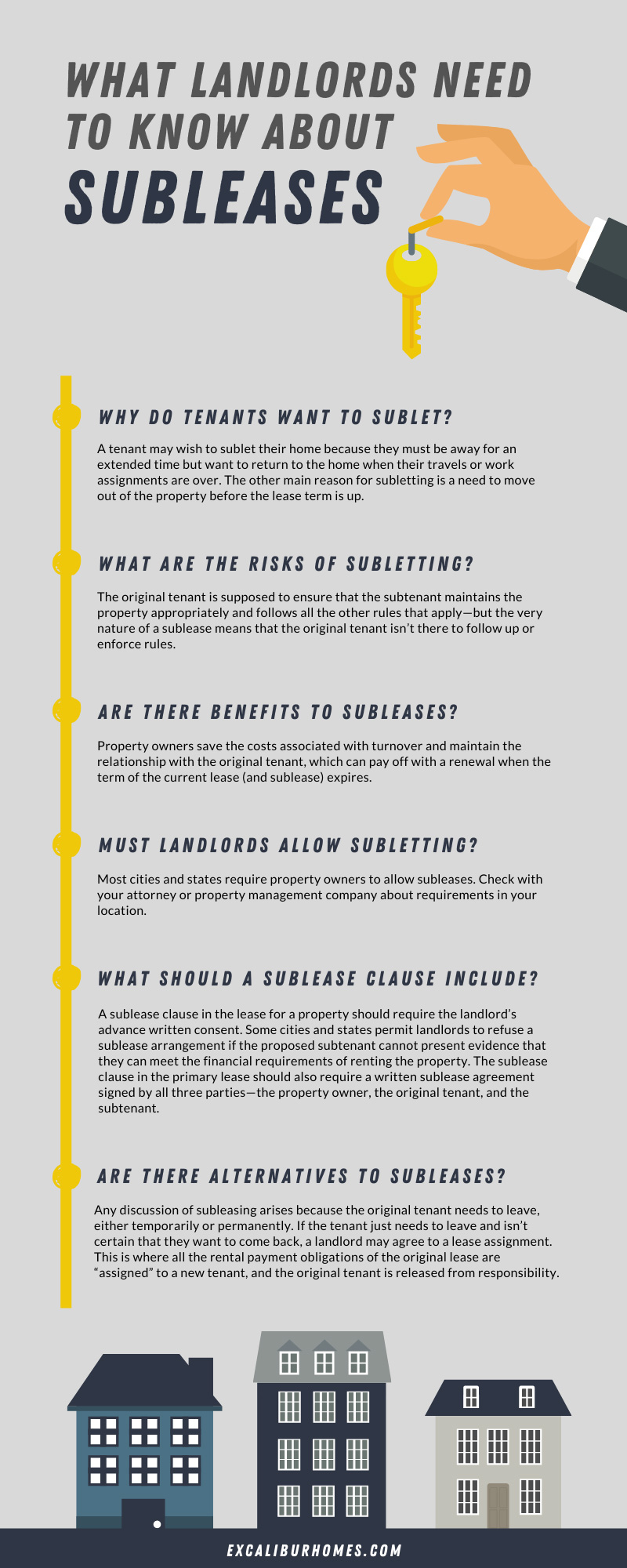
A sublease is an agreement between a tenant and a third party in which the third party lives in the rented property and pays the tenant rent. The original tenant retains all their responsibilities to the property owner under the lease and assumes the role of landlord to the subtenant. If property owners haven’t studied what landlords need to know about subleases, they could end up with an unapproved resident, a vacant apartment, or a tenant who has disappeared and skipped out on the rent.
Why Do Tenants Want to Sublet?
A tenant may wish to sublet their home because they must be away for an extended time but want to return to the home when their travels or work assignments are over. The other main reason for subletting is a need to move out of the property before the lease term is up. In most cases, a sublease is a good strategy for good tenants to continue to meet their responsibilities while living away from the property.
What Are the Risks of Subletting?
Sublease arrangements are not without risk. Landlords spend a lot of time and resources screening tenants, and a sublease means that the original, approved tenant no longer lives in the home. The original tenant is supposed to ensure that the subtenant maintains the property appropriately and follows all the other rules that apply—but the very nature of a sublease means that the original tenant isn’t there to follow up or enforce rules. Worse, if the subtenant stops paying rent, fails to take occupancy, or damages the property, and the original tenant is absent, the landlord has a big mess on their hands.
Are There Benefits to Subleases?
Sublease arrangements that work out well mean that, even if a screened, reliable tenant must move out early or leave the property for a prolonged time, rent payments continue for the full term of the lease. The original tenant finds the subtenant, and the property remains occupied and maintained. Property owners save the costs associated with turnover and maintain the relationship with the original tenant, which can pay off with a renewal when the term of the current lease (and sublease) expires.
Must Landlords Allow Subletting?
Most cities and states require property owners to allow subleases. Check with your attorney or property management company about requirements in your location. The most important thing landlords need to know about subleases is that the primary lease governs the requirements of a sublease. Property owners should ensure that any lease they routinely use contains a sublease clause that spells out the requirements for any sublease arrangements and expressly incorporates the terms of the original lease as applying to the sublease as well.
What Should a Sublease Clause Include?
A sublease clause in the lease for a property should require the landlord’s advance written consent. When the original tenant finds a prospective subtenant, the subtenant should complete the standard rental application and undergo the same screening as the original tenant. Some cities and states permit landlords to refuse a sublease arrangement if the proposed subtenant cannot present evidence that they can meet the financial requirements of renting the property. The sublease clause in the primary lease should also require a written sublease agreement signed by all three parties—the property owner, the original tenant, and the subtenant.
A sublease agreement should make it plain that the subtenant is responsible for complying with rules that apply to the property and for maintaining the property as any other tenant would. Be specific in a sublease about both the original tenant’s and the subtenant’s responsibilities for payment and maintenance. Specify the term of the sublease. Typically a sublease lasts only for the remainder of the original lease.
A sublease can specify how the subtenant pays rent—either to the original tenant or directly to the property owner. The best option is probably to have the subtenant pay directly; that way, the property owner doesn’t have to track down the original tenant in another city or even abroad to collect unpaid rent.
Are There Alternatives to Subleases?
While, in most cities and states, a landlord cannot refuse to allow a tenant to sublet to a qualified sublessee, the landlord may be able to offer other options if desired. Alternatives include lease assignment or early termination provisions.
Landlords should think about why they would want to find an alternative to a sublease arrangement. Any discussion of subleasing arises because the original tenant needs to leave, either temporarily or permanently. Subleasing is a great option for tenants who are certain they want to return to the home after a time away. Other tenants, however, may simply want to move elsewhere without damaging their reputation as a good, responsible tenant who pays rent on time and maintains the property. If the tenant just needs to leave and isn’t certain that they want to come back, a landlord may agree to a lease assignment. This is where all the rental payment obligations of the original lease are “assigned” to a new tenant, and the original tenant is released from responsibility.
Assignments must be approved by the landlord, comply with terms for assignments spelled out in the original lease, and be put in writing. Unless otherwise specified, however, a lease assignment requires that the original tenant be still responsible for maintenance and subject to remedies for property damage. An assignment terminates the rental relationship with the original tenant and creates a direct relationship with the new tenant, but it should also be specific about policies and rules that will apply to the assignee.
Another alternative for property owners is to discuss an early termination agreement with the current tenant. With sufficient notice and, usually, the payment of a fee, the original tenant is allowed to vacate the home before the termination date of the original lease. The fee buys the property owner time to prepare the property for showing and to locate a new tenant.
If you own a rental property in the metro Atlanta area and have a tenant who has inquired about subletting, contact Excalibur Homes. As an Atlanta property management company, Excalibur can help property owners create a successful sublease arrangement.




